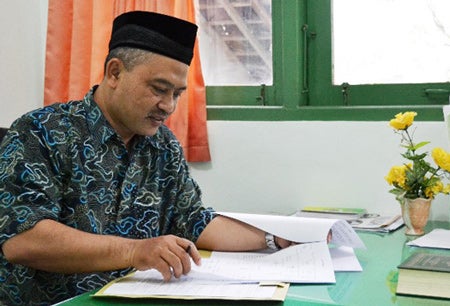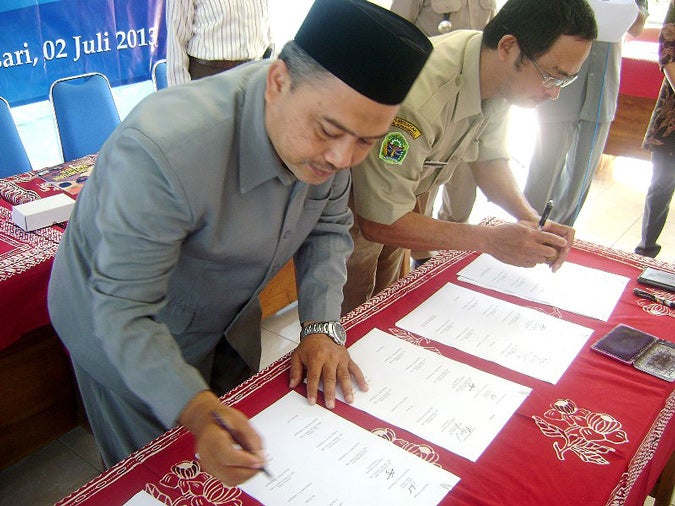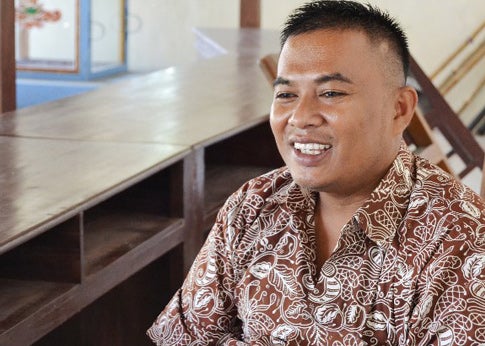Don't let childhood mean motherhood
Addressing Child Marriage in Gunungkidul, YogyakartaDate:
Authors: Defirentia One and Niken Anggrek Wulan
Child marriage is a major social problem in Gunungkidul, Yogyakarta Province, with almost one-in-two of all child marriages occurring in the province. Over the past three years there has been a significant increase in cases: from 15 in 2010, to 161 in 2013, and a slight decrease to 146 in 2014. The trend is upward in Yogyakarta as a whole. Generally, the main explanation for child marriage is early pregnancy, which also suggests a lack of awareness and education among parents and children.
To combat the concerning rise in child marriage, the UN Trust Fund to end Violence Against Women, is supporting a project entitled ‘Establishing Integrated Response for Women Survivors of Violence through Integration of Domestic Violence Eradication Act and Children Protection Act into Syariah Law’. The project is implemented by Rifka Annisa in Yogyakarta, Kelompok Kerja Transformasi Gender Aceh (KKTGA) or Aceh Gender Transformative Working Group in Aceh, Lembaga Bantuan Hukum Apik (LBH Apik) or Legal Aid Institution Apik in Jakarta, and Lembaga Bantuan Hukum dan Pemberdayaan Perempuan Indonesia LBHP2I or Legal Aid and Women's Empowerment Institution of Indonesia in Makassar.
Rifka Annisa supports the Office of Religious Affairs (KUA) and other stakeholders, provides capacity building, and facilitates community advocacy in villages. The project trained 153 religious affairs officers during a three-and-a-half year period. One of them was Yosep Muniri, former head of KUA Patuk and currently head of KUA Gedangsari, and a key project stakeholder and catalyst in the prevention of violence against women and children. Patuk sub-district of Gunungkidul faced particular challenges with increasing cases of child marriage. Rifka Annisa helped to empower the community through workshops, seminars, training and regular discussion with adults and teenagers. They also developed the capacity of KUA Patuk’s staff – including Yosep Muniri – to take a leading role in eliminating child marriage and violence against women, including through the key element of a religious approach.

The KUA and the Advisory Board for the Development of Marriage Preservation (BP4) in Gedangsari – also a religious body in society – have also initiated efforts to prevent gender-based violence, as well as child marriage, through conducting socialization, signing a memorandum of understanding (MoU), case referrals, conducting pre-marriage courses, and providing mediation sessions in Religious Courts. The involvement of religious leaders (and institutions) as change agents through advocacy and campaigns at sub-district level, is again, an important and effective initiative, and one that makes uptake of messages more likely to be accepted in the context of a Muslim society. Gender equality and gender justice through the religious teachings have been an effective approach and could be a useful for religious leaders from non-Muslim communities.
Bringing the issue of child marriage to the community
Yosep’s passion is motivated by a story of child marriage experienced by his neighbour, while capacity building provided by Rifka Annisa has enabled him to take action. The girl in question gave birth to an underweight malnourished baby. “I talked to health clinic officers and asked them to provide services to the girl without blaming the girl, but realized that it is a wider social problem that needs to be solved”, said Yosep.

To address the challenges, Yosep worked with Gedangsari authorities to resolve issues through a (MoU) on how to prevent and respond to cases of child marriage. "Finally after the long consultation and discussion, we agreed on signing the MoU among multi-sectoral actors including village headman, the KUA, the school authority, police officers, health clinics, and sub-village officer," said Yosep.
The MoU was signed on 2 July 2013 in the presence of the Vice Regent of Gunungkidul District, followed by a declaration among sub-village heads (the level of government authority closest to comunities) in Gedangsari, on 4 March 2014.Following the MoU, significant progress was made in Gedangsari sub-district, with the village heads, health clinics, KUA and schools jointly rolling out the violence against women prevention programme in the community. Initiatives included enhanced awareness for junior high school students and teenagers, access to information for women and girls concerning sexual abuse, gender-based violence, sexual reproductive health and prevention of early marriage, and a pre-marriage course for 100 future grooms.
Every six months, sub-village heads conduct an evaluation. It showed that the number of early marriages in Gedangsari decreased from nine cases in 2013 to six in 2014 (where two out of the six 6 cases were persons not originally from this sub-district, who married in Gedangsari sub-district). Yosep says "We would like to show our seriousness in this matter. I think it's a very effective way to initiate a movement" The work of KUA Gedangsari in initiating the MoU has been replicated in three other sub-districts in Gunungkidul (Wonosari, Saptosari, and Patuk).
At the regional level, Rifka Annisa, together with KUA and communities, push the government to enact the Regulation of the Regent Gunungkidul on pre-marriage courses. At national level, they advocate for regulation of the KUA. Activities following the MoU are mostly self funded by Gedangsari authorities, including socialization on reproductive health for students, counseling for child marriage, and socialization to people at sub-village level, conducted by sub-village heads.
Siswanta, sub-village head for Ngalang in Gedangsari, revealed an important change following the declaration among sub-village heads. "Before the MoU, we acknowledged the impact of child marriage, but we found it hard to ask our community and young people to pay attention to this matter." After the MoU, sub-village heads in Gedangsari were committed to preventing or reducing child marriage, divorce, as well as infant and maternal mortality. "Divorce, infant and maternal mortality, and child marriage put our community at high risk," Siswanta added.

Siswanta hoped that "if the people live in peace and comfort, we can focus on building the village that we love and we are proud of", while Yosep wants to continue to prevent child and early marriage, "We do not want it to happen. No matter how small the work we have done, the benefit could be delivered to the next generation," he said.
About the Trust Fund
The United Nations Trust Fund to End Violence Against Women (UN Trust Fund) was established in 1996 by UN General Assembly Resolution 50/166. The Trust Fund identifies and supports innovative initiatives around the world that aim to break new ground in the growing movement to eliminate violence against women in all of its manifestations. The UN Trust Fund is administered by the United Nations Entity for Gender Equality and the Empowerment of Women (UN Women) on behalf of the United Nations System.
This story has been shared by Defirentia One and Niken Anggrek Wulan. Both of them are working with Media and Public Relation, Rifka Annisa.